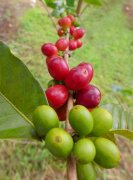The planting history and long tradition of Nicaraguan coffee

For professional baristas, please follow the coffee workshop (Wechat official account cafe_style)
It was found that the use of grain in Abyssinia (Ethiopia) was around 900 AD.
It took place in Yemen and Saudi Arabia, and Muslim pilgrims traveling to Mecca were taken to India and Ceylon. The 17th century.
The Dutch took him to Java and vegetable greenhouses in the Netherlands in the early 18th century.
France would take him to the American colony of Martinique in 1720 and then to Brazil, Colombia and Central America.
Maybe you also reached Costa Rica in 1840, and Nicaragua in 1830.
Named Manuel Matus, the University of Nicaragua grows Coffee in Guatemala, and his father Vanke near La Sewa brought a report to the field in 1845.
In 1848 in the author and Resource Manager, George Squire found that it was taken regularly in Nicaragua.
Come to Matagalpa
Before the end of 1852 came to Graydon (San Juan de el Norte), crossed the Panamanian isthmus by Ludwig (Louis) Elster and his spouse Kaherina Braun, a German couple riding Leo San Juan and Lake Nicaragua and estrcho of Rivas.
Although el Sur in San Juan de el Sur hopes to get on a boat that will take him to California where the gold rush attracts, they would rather be back in New York with the Americans, giving them the idea that the gold rush has a performance appraisal system designed, no more gold in California. Then put on Louis a little disappointed and don't want to go home with empty hands, you live with the Nicaraguan people where they can find gold in Nicaragua. They told him to the north, near Matagalpa, that it was gold.
Beyond Louis' leading spouse St. Ramon, where they bought land from the Indians and set up his estate "Larima", Don Louis extracted gold instead of the amount that would be needed. so they were planted coffee seeds Louis got on horseback and he rode to Managua, Don. He was surprised to notice that the food was significantly larger than the shrubs grew in the Pacific Ocean, but also more aromatic and sour.
Mr. Elster, pull the ripe grain to the sun and therefore dry export to Germany to thresh them. Transportation is not economical because they take up a lot of bulk and the taste is affected; he thinks the red shell is removed and then a few bottles of pulpers are designed.
In 1891 he came from Ottokur, Germany, to several bottles with deleted pulp (shell), and later found that jelly-like material covered with depulped possible screw head of the grain machine pulper this to Elster development it if you get the fermetar beads for about 36 hours, then rinse with clean water, it is easier to remove, we call it washed coffee beans, hence the birth of what is now known as "Coffee washing Matagalpa".
For coming to Matagalpa in 1888, he was invited by the government to develop and grow coffee, several young Germany, Britain and the United States. Louis Elster, who grows coffee in a very good style, according to Don Alberto Vogl in his memoirs, is owned by Don William (William) Jericho when he founded the rose city of Jericho near St. Ramon, which is now owned by Jericho.
So born coffee farms still exist: Hans Bosch, Alsace's Otto Gangting, Saxony, Bavaria, Alfredo Mayer Alberto Vogl Hammonia (Hamburg) Bruno Milish, Washington Jack Sweet, Milwaukee, (Trento) Trentino Vita, etc.
Washed coffee gets preferential prices in Europe, exported to ports in Bremen, Hamburg and Trieste.
Then in 1912 began whipping here in Nicaragua rather than in the buyer's country.
Drying is the sun in a wooden sieve, then ventilated in the well with the wooden floor, where men and wooden blades are constantly stirred to dry it, preventing it from getting inside the cellar. Then the clothes dryer type Guardiola settled near Caledagnore, Esquivel and other wood ovens with the benefits of heating and air-drying.
Then they began to build the banks leading to dry benefits and Matagalpa, S é baco and Managua. They use the sun to occur in the area all year round. They build courtyard concrete where they dry coffee, in addition to threshing, sorting and export. So it will be finished by this date.
The use of black plastic bed dry coffee from 1960 was the first time Don Alfonso Eagle, whose interest in Kokomo, practiced, through its economy, was not very desirable on the quality of coffee, as coffee could be dry now has spread or dropped to the necktie army with an unpleasant smell.
The current number of wet profits in Nicaragua can go to 1000 years and dry benefits of about 50. 35 dry benefits exist only between Matagalpa and Sevako, which have dryers «Guardiola "type furnaces burning rice husks and diesel burners, the latter waiting for people.
Important Notice :
前街咖啡 FrontStreet Coffee has moved to new addredd:
FrontStreet Coffee Address: 315,Donghua East Road,GuangZhou
Tel:020 38364473
- Prev

Arabica coffee exports from Latin America fell by 3.24%.
For the exchange of professional baristas, please follow the coffee workshop (Wechat official account cafe_style) Arabica coffee (mild) Arabica coffee produced in nine Latin American countries in the same period before 2013-2014. compared with the same period before 2013-2014, crops fell by 3.24% exports today reported sector source Arabica coffee (mild) from nine Latin American countries before 2013-2014.
- Next

Nicaragua suffers from leaf rust and coffee exports decline
For the exchange of professional baristas, please follow the coffee workshop (Wechat official account cafe_style) income and comparison, Nicaraguan coffee exports fell by 22.2% and 15.1% respectively, in the autumn harvest between October 2013 and June 2013, the same period compared with this year's report yesterday's official source. Coffee sales abroad during the reference, a total of $200 million 67.1 million, 22.2%
Related
- Workers collapse! Lucky suspects that it will introduce freshly cut fruits?!
- 1-point subsidy recipients wear thousand-yuan watches?! Local response: For low-income households
- Can lightly roasted coffee beans be used to extract espresso? How finely should you grind high-quality coffee beans to make Italian latte?
- What is the difference between the world's top rose summer coffee and Yejia Shefi? What are the flavor characteristics of Yega Shefi coffee and Panama rose summer?
- The ceremony is full! Starbucks starts to cut the ribbon at a complimentary coffee station?!
- A whole Michelin meal?! Lucky launches the new "Small Butter Apple Crispy Latte"
- Three tips for adjusting espresso on rainy days! Quickly find the right water temperature, powder, and grinding ratio for espresso!
- How much hot water does it take to brew hanging ear coffee? How does it taste best? Can hot water from the water dispenser be used to make ear drip coffee?
- What grade does Jamaica Blue Mountain No. 1 coffee belong to and how to drink it better? What is the highest grade of Blue Mountain coffee for coffee aristocrats?
- What are the flavor characteristics of the world-famous coffee Blue Mountain No. 1 Golden Mantelin? What are the characteristics of deep-roasted bitter coffee?

